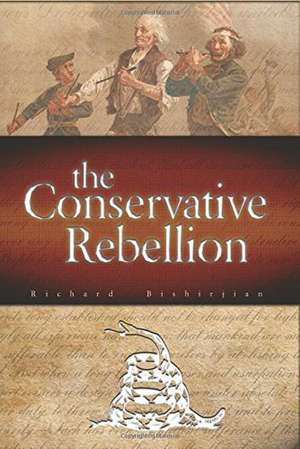The Conservative Rebellion
Autor Richard Bishirjian Ph.D.en Limba Engleză Hardback – 19 aug 2015
Dr. Richard Bishirjian's Conservative Rebellion examines the American conservative movement in light of phases of American history in which the life of the American nation took shape from forces and conditions of the American soul. The author argues that the first phase of our common political life was a rebellion that we call the "Spirit of '76." That rebellion attempted to preserve the practices, traditions, and customary rights of a tradition of self-government that developed during the 140 years of the Colonial era.
That first "Conservative Rebellion," erupting in Lexington and Concord, was a conservative rebellion whose spirit shapes American politics and society even today through the American conservative "movement." The author contrasts their rebellion to the revolutionary political religion of President Woodrow Wilson. President Woodrow Wilson's redemptive desire to destroy the "balance of power politics" of early twentieth century Europe engendered conditions that led to World War II and, ultimately, the Korean War, the war in Vietnam, and two wars by George W. Bush in Afghanistan and Iraq that the President clearly intended to be redemptive from the authoritarian practices of the Middle East.
The divisions that trouble American society today were unleashed by Woodrow Wilson's political religion and continued by Democrat and Republican Presidents alike. The Conservative Rebellion has the potential, the author believes, to replace political religion with lessons learned from the statesmanship of Americans during the Colonial and Founding eras and the mid-twentieth century revival of classical political thought. The renaissance of classical political theory by University of Notre Dame political theorists Stanley Parry, Gerhart Niemeyer, and Eric Voegelin and University of Chicago political scientist Leo Strauss is central to the conservative "rebellion" of twenty-first century American conservatives.
Their knowledge that recovery of political order is necessarily based on recovery of spiritual substance and order of American society, culture, and soul is a cautionary lesson that there are no quick fixes to the crises, divisions, and failed Presidents of modern America.
Preț: 130.27 lei
Preț vechi: 156.18 lei
-17% Nou
24.93€ • 25.88$ • 20.79£
Carte indisponibilă temporar
Specificații
ISBN-10: 1587311585
Pagini: 192
Dimensiuni: 152 x 229 x 23 mm
Greutate: 0.42 kg
Ediția:1
Editura: St. Augustine Press
Colecția St. Augustines Press
